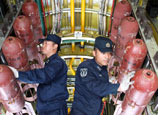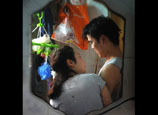
 |
| Dr. John B. Cobb Jr., President of the Institute for Postmodern Development of China at Claremont Lincoln University, introduces the concept of ecological civilization in a seminar held in Beijing on July 21. (China.org.cn/Jiao Meng) |
As a leading postmodernism ideologist, Dr. John B. Cobb Jr. shared his thoughts with China’s scholars and environmental activists on how China can transform into an ecological civilization.
He first explained the concept of ecological civilization which is "very different than a capitalist society built on growth, wanting to postpone the negative consequences as long as possible".
"The economic theory that was taught and continued to be taught in all of our universities was developed at a time when people thought that the natural resources were unlimited. It also expressed a profound individualism with no sensitivity to human relationship other than those of employer-employee and those who received money from capital investments," he said.
On the contrary, he believed that lasting human happiness is the most important measure, instead of the increase of economic data.
"Many studies have shown that peoples’ happiness depends upon to a minimum extent, on worldly goods that GNP is encouraging us to buy, and depends much more on healthy human community," he explained.
He held that the path to realize ecological civilization should be started from the community level.
"There are very fundamental human needs that can only be satisfied if responded to in small local communities of face-to-face relations and physical mutual affection," he said.
Director of Global Village – Beijing Liao Xiaoyi backed his ideas with practices in rural China. She said, "I have been working in rural communities for five years. I believe China’s hope of ecological civilization lies in community."
She gave an example of Wuxi in Chongqing. No one planted trees in public spaces in this community or ever looked after them. But now when residents unite as a community instead of atomized individuals, their passion and intelligence act "beyond her imagination".
"They implement eco-policies such as methane and abandoning chemical fertilizers and pesticides very fast. It took two years to offer high-quality farming products to the market and the rice sells at two-fold of a price," she added.
















 Migrant children’s dream of stage
Migrant children’s dream of stage


![]()
